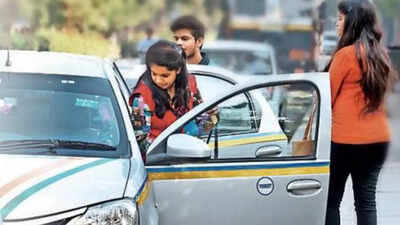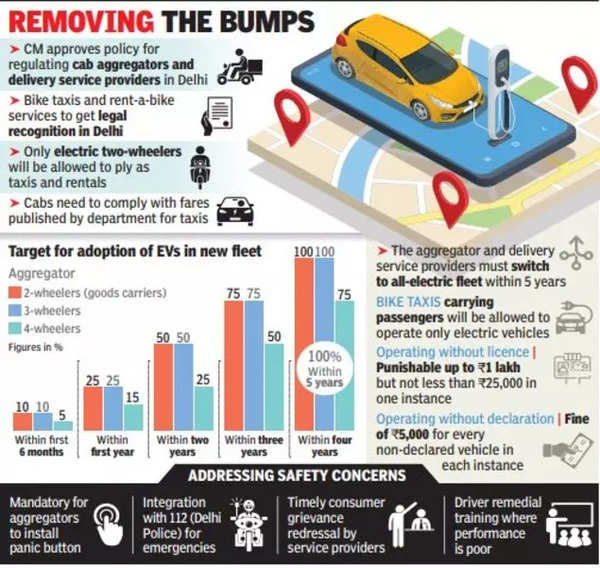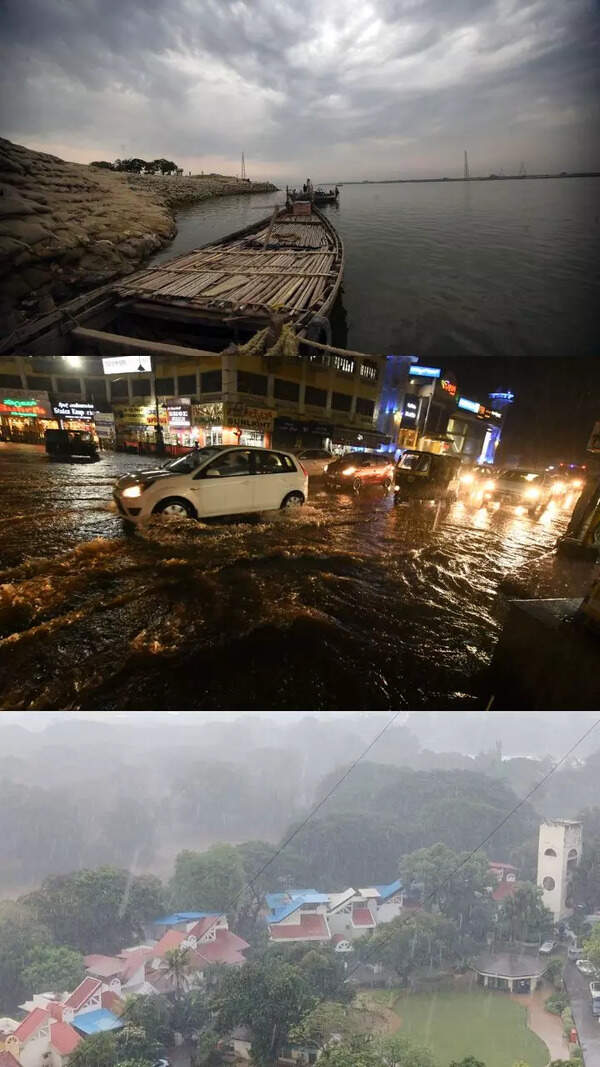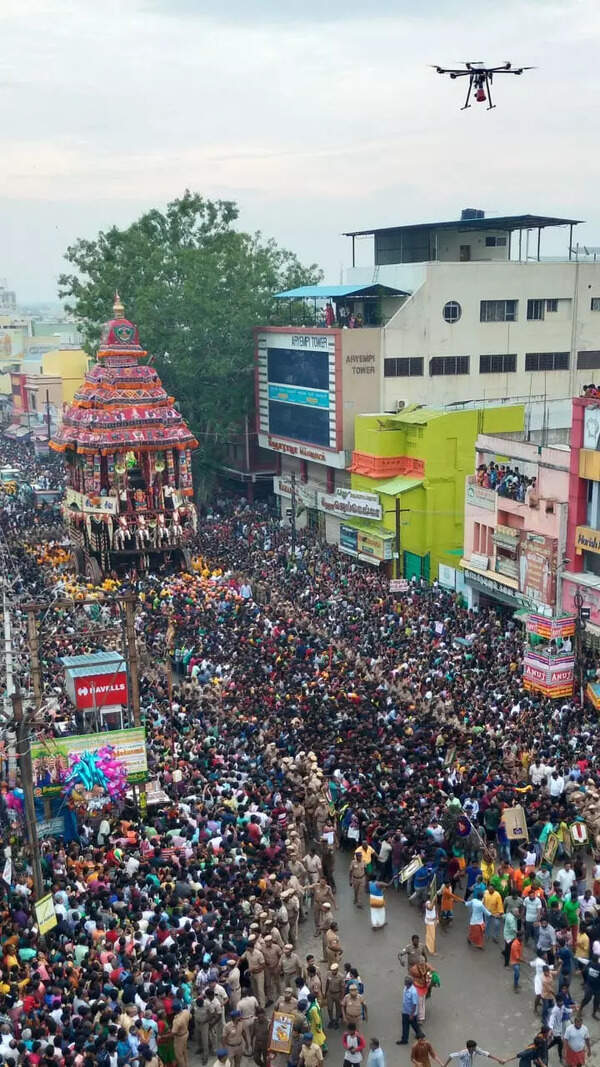- News
- City News
- delhi News
- Twin goals of Delhi cab aggregator policy: Your safety, cleaner air
Twin goals of Delhi cab aggregator policy: Your safety, cleaner air

The policy also focuses on granting legal status to motorbike taxis and transitioning cabs to electric vehicles in phases, with full fleet electrification in five years.
NEW DELHI: Mandatory panic buttons in taxis, integration with emergency number 112 and timely resolution of consumer grievances are the highlights of the Motor Vehicle Aggregator Scheme 2023, which aims to regulate the cab aggregators and delivery service providers in Delhi. Chief minister Arvind Kejriwal gave the thumbs up to the scheme on Wednesday and forwarded it to lieutenant governor V K Saxena for his approval.

The policy also focuses on granting legal status to motorbike taxis and transitioning cabs to electric vehicles in phases, with full fleet electrification in five years. Only electric two wheelers will be allowed in Delhi for motorbike taxis and two-wheeler renting services. These provisions are in-line with the Delhi Electric Vehicles Policy 2020.
After the LG's approval, the scheme will be put in public domain for people' feedback. Comments from the transport department will also be invited. After that, it will be given its final shape. Kejriwal said, "This scheme prioritises the safety of passengers and ensures timely grievance redressal, while promoting electric vehicles to reduce Delhi's pollution levels."
Transport minister Kailash Gahlot said, "This is the first time in India that a state will regulate taxi service providers. The goal is a sustainable public transport that ensures safety of passengers and reduction in pollution."
The Motor Vehicle Aggregator Scheme 2023 will be applicable to any person or entity that operates, on-boards or manages a fleet of motor vehicles through digital, electronic or any other means to ferry passengers. A panic button in the vehicle will be mandatory as is the integration of the fleets with helpline 112 for emergencies. The scheme provides for a mechanism to ensure timely consumer grievance redressal by service providers, enforcement of vehicle fitness and pollution control. It also makes it compulsory for drivers to undergo remedial training whenever their performances are rated as poor.
In the first six months of the scheme, 5% of all new cars are to be e-vehicles. Four years from its notification, all new commercial two wheelers and three wheelers will need to be EVs. Similarly, five years from the scheme's notification, all new commercial four wheelers are to be EVs. The delivery service providers are also mandated to switch to EV fleet by April 1, 2030.
The scheme also lays down a 'polluter pays' principle, making the licence fee for a conventional vehicle significantly higher than for an EV. For instance, the licence fee for an electric taxi may be zero, but Rs 650 for a CNG cab. Gahlot confirmed, "Onboarding of any EV will attract a zero licence fee."

The policy also focuses on granting legal status to motorbike taxis and transitioning cabs to electric vehicles in phases, with full fleet electrification in five years. Only electric two wheelers will be allowed in Delhi for motorbike taxis and two-wheeler renting services. These provisions are in-line with the Delhi Electric Vehicles Policy 2020.
After the LG's approval, the scheme will be put in public domain for people' feedback. Comments from the transport department will also be invited. After that, it will be given its final shape. Kejriwal said, "This scheme prioritises the safety of passengers and ensures timely grievance redressal, while promoting electric vehicles to reduce Delhi's pollution levels."
Transport minister Kailash Gahlot said, "This is the first time in India that a state will regulate taxi service providers. The goal is a sustainable public transport that ensures safety of passengers and reduction in pollution."
The Motor Vehicle Aggregator Scheme 2023 will be applicable to any person or entity that operates, on-boards or manages a fleet of motor vehicles through digital, electronic or any other means to ferry passengers. A panic button in the vehicle will be mandatory as is the integration of the fleets with helpline 112 for emergencies. The scheme provides for a mechanism to ensure timely consumer grievance redressal by service providers, enforcement of vehicle fitness and pollution control. It also makes it compulsory for drivers to undergo remedial training whenever their performances are rated as poor.
In the first six months of the scheme, 5% of all new cars are to be e-vehicles. Four years from its notification, all new commercial two wheelers and three wheelers will need to be EVs. Similarly, five years from the scheme's notification, all new commercial four wheelers are to be EVs. The delivery service providers are also mandated to switch to EV fleet by April 1, 2030.
The scheme also lays down a 'polluter pays' principle, making the licence fee for a conventional vehicle significantly higher than for an EV. For instance, the licence fee for an electric taxi may be zero, but Rs 650 for a CNG cab. Gahlot confirmed, "Onboarding of any EV will attract a zero licence fee."
Start a Conversation
FOLLOW US ON SOCIAL MEDIA
FacebookTwitterInstagramKOO APPYOUTUBE










